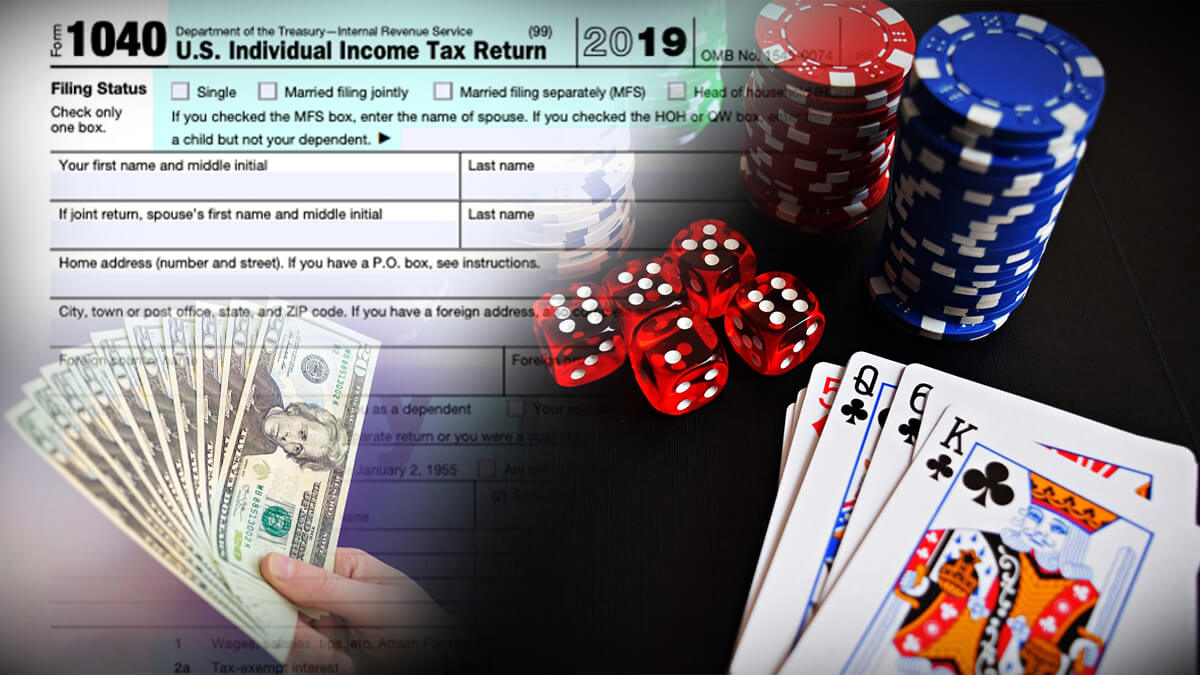Do Casinos Report Blackjack Winnings To The Irs
- Do Casinos Report Blackjack Winnings To The Irs Refund
- Do Casinos Report Blackjack Winnings To The Irs Money
- Do Casinos Report Blackjack Winnings To The Irs Refunds
More Articles

Do you like to gamble? If so, then you should know that the taxman beats the odds every time you do. The Internal Revenue Service and many states consider any money you win in the casino as taxable income. This applies to all types of casual gambling – from roulette and poker tournaments to slots, bingo and even fantasy football. In some cases, the casino will withhold a percentage of your winnings for taxes before it pays you at the rate of 24 percent.
Casino Winnings Are Not Tax-Free
Legally, you must report any income from any source to the IRS, and must pay appropriate income tax. In a practical sense, it is very uncommon for a person to declare a small winning from a casino. If you cash out more than $1,200 from a MACHINE at a casino, it is true that they will take taxes out and issue you a 1099. Specifically, your tax return should reflect your total year’s gambling winnings – from the big blackjack score to the smaller fantasy football payout. That’s because you’re required to report each stroke of luck as taxable income — big or small, buddy or casino.
Casino winnings count as gambling income and gambling income is always taxed at the federal level. That includes cash from slot machines, poker tournaments, baccarat, roulette, keno, bingo, raffles, lotteries and horse racing. If you win a non-cash prize like a car or a vacation, you pay taxes on the fair market value of the item you win.
The IRS Takes Gambling Record Keeping Seriously 10 April 2001 By John G. Last week I stressed the importance of being prepared when tax season rolls along if you have gambling winnings to report. If you have kept the proper records and you are eligible to itemize, you will be able to offset gambling winnings on your federal return if. Gambling winnings are fully taxable and you must report the income on your tax return. Gambling income includes but isn't limited to winnings from lotteries, raffles, horse races, and casinos. It includes cash winnings and the fair market value of prizes, such as cars and trips. Even if you do not receive a W-2 form, you’re required to report all gambling winnings, paying tax on the income. However, you can also report your losses, offsetting the amount that you owe.
By law, you must report all your winnings on your federal income tax return – and all means all. Whether you win five bucks on the slots or five million on the poker tables, you are technically required to report it. Job income plus gambling income plus other income equals the total income on your tax return. Subtract the deductions, and you'll pay taxes on the resulting figure at your standard income tax rate.
How Much You Win Matters

While you're required to report every last dollar of winnings, the casino will only get involved when your winnings hit certain thresholds for income reporting:
- $5,000 (reduced by the wager or buy-in) from a poker tournament, sweepstakes, jai alai, lotteries and wagering pools.
- $1,500 (reduced by the wager) in keno winnings.
- $1,200 (not reduced by the wager) from slot machines or bingo
- $600 (reduced by the wager at the casino's discretion) for all other types of winnings but only if the payout is at least 300 times your wager.
Win at or above these amounts, and the casino will send you IRS Form W2-G to report the full amount won and the amount of tax withholding if any. You will need this form to prepare your tax return.
Understand that you must report all gambling winnings to the IRS, not just those listed above. It just means that you don't have to fill out Form W2-G for other winnings. Income from table games, such as craps, roulette, blackjack and baccarat, do not require a WG-2, for example, regardless of the amount won. It's not clear why the IRS has differentiated it this way, but those are the rules. However, you still have to report the income from these games.
What is the Federal Gambling Tax Rate?
Standard federal tax withholding applies to winnings of $5,000 or more from:
- Wagering pools (this does not include poker tournaments).
- Lotteries.
- Sweepstakes.
- Other gambling transactions where the winnings are at least 300 times the amount wagered.
If you win above the threshold from these types of games, the casino automatically withholds 24 percent of your winnings for the IRS before it pays you. If you cannot provide a Social Security number, the casino will make a 'backup withholding.' A backup withholding is also applied at the rate of 24 percent, only now it includes all your gambling winnings from slot machines, keno, bingo, poker tournaments and more. This money gets passed directly to the IRS and credited against your final tax bill. Before December 31, 2017, the standard withholding rate was 25 percent and the backup rate was 28 percent.
The $5,000 threshold applies to net winnings, meaning you deduct the amount of your wager or buy-in. For example, if you won $5,500 on the poker tables but had to buy in to the game for $1,000, then you would not be subject to the minimum withholding threshold.

It's important to understand that withholding is an entirely separate requirement from reporting the winning on Form WG-2. Just because your gambling winning is reported on Form WG-2 does not automatically require a withholding for federal income taxes.
Can You Deduct Gambling Losses?
If you itemize your deductions on Schedule A, then you can also deduct gambling losses but only up to the amount of the winnings shown on your tax return. So, if you won $5,000 on the blackjack table, you could only deduct $5,000 worth of losing bets, not the $6,000 you actually lost on gambling wagers during the tax year. And you cannot carry your losses from year to year.
The IRS recommends that you keep a gambling log or spreadsheet showing all your wins and losses. The log should contain the date of the gambling activity, type of activity, name and address of the casino, amount of winnings and losses, and the names of other people there with you as part of the wagering pool. Be sure to keep all tickets, receipts and statements if you're going to claim gambling losses as the IRS may call for evidence in support of your claim.
What About State Withholding Tax on Gambling Winnings?
There are good states for gamblers and bad states for gamblers. If you're going to 'lose the shirt off your back,' you might as well do it in a 'good' gambling state like Nevada, which has no state tax on gambling winnings. The 'bad' states tax your gambling winnings either as a flat percentage of the amount won or by ramping up the percentage owed depending on how much you won.
Each state has different rules. In Maryland, for example, you must report winnings between $500 and $5,000 within 60 days and pay state income taxes within that time frame; you report winnings under $500 on your annual state tax return and winnings over $5,000 are subject to withholding by the casino due to state taxes. Personal tax rates begin at 2 percent and increase to a maximum of 5.75 percent in 2018. In Iowa, there's an automatic 5 percent withholding for state income tax purposes whenever federal taxes are withheld.
State taxes are due in the state you won the income and different rules may apply to players from out of state. The casino should be clued in on the state's withholding laws. Speak to them if you're not clear why the payout is less than you expect.
How to Report Taxes on Casino Winnings
You should receive all of your W2-Gs by January 31 and you'll need these forms to complete your federal and state tax returns. Boxes 1, 4 and 15 are the most important as these show your taxable gambling winnings, federal income taxes withheld and state income taxes withheld, respectively.
You must report the amount specified in Box 1, as well as other gambling income not reported on a W2-G, on the 'other income' line of your IRS Form 1040. This form is being replaced with a simpler form for the 2019 tax season but the reporting requirement remains the same. If your winnings are subject to withholding, you should report the amount in the 'payment' section of your return.
Different rules apply to professional gamblers who gamble full time to earn a livelihood. As a pro gambler, your winnings will be subject to self-employment tax after offsetting gambling losses and after other allowable expenses.
Read More:
We doubt that anyone ever woke up thinking, “Gee, I hope I get audited by the IRS this year”. An IRS audit could easily be one of the worst things that could happen to you this year. So if you want to avoid receiving that ominous letter from the IRS that your 2015 tax return is being audited here are seven red flags you need to totally avoid.
Not reporting all of your taxable income
Those 1099’s and W-2s you received this past January? You weren’t the only one that got them. The IRS got them too. It’s important to make sure you report all of the required income on your return. The computers used by the IRS are pretty darn good at matching the numbers on your return with the numbers on your 1099s and W-2s. If they turn up a mismatch this will create a red flag and the IRS computers will spit out a bill. If those darn computers do make a mistake and you receive a tax form that shows income that wasn’t yours or lists incorrect amounts of income, you will need to get the issuer to file the correct form with the IRS. And what about that income you earned on those side jobs? In most cases you should have received a 1099 documenting your earnings. If not, this is definitely a case where it’s better to be safe than sorry and report it.
Do Casinos Report Blackjack Winnings To The Irs Refund
Taking deductions that are higher than average
If the IRS spots deductions on your return that are disproportionately large in comparison with your income, it may pull your return for review. For example, a very large medical expense –again out of proportion to your income – could cause a red flag. However, if you do have the documentation to support the deduction then don’t be afraid to claim it.
Claiming really big charitable deductions

Charitable deductions can be a great write off. Plus, when you contribute to a charity it can make you feel all fuzzy and warm inside. However, if those deductions are disproportionately large in comparison with your income, it will raise a red flag. The reason for this is because the IRS knows what is the average charitable deduction for people at your level of income. Did you donate some very valuable property? In this case we hope you got an appraisal for it. Did you make a non-cash donation over $500? Then you better make sure you file form 8283. if you don’t file this form or if you don’t have an appraisal supporting that big donation you’ll become an even bigger target for auditing.

Claiming big gambling losses or not reporting gambling winnings
If you’re a recreational gambler you must report your winnings as “other income” on the front page of your 1040 form. If you’re a professional gambler you will need to report your winnings on Schedule C. If you don’t report gambling winnings this can draw the attention of the IRS – especially in the event that the casino or other venue reported your winnings on form W-2G. It can also be very risky to claim big gambling losses. In fact, what you should do is deduct your losses only to the extent that you report your gambling winnings. For example, if you were to report you had won $5000 gambling but had losses of $20,000, this could cause a red flag. Also, only professional gamblers can write off the costs of meals, lodging and other expenses related to gambling. And the surest way to invite an audit is by writing off what you lost at gambling but no gambling income. If you’ve done any of these things, or are worried about some other common tax return mistakes, it might be wise to file an amended tax return and account for those wins or losses correctly.
Writing off a hobby as a loss
You will dramatically increase the odds of “winning” an IRS audit if you file a schedule C showing big losses from any activity that could be considered a hobby such as jewelry making, coin and stamp collecting, dog breeding, and the like. IRS agents are especially trained to ferret out people who improperly deduct losses associated with a hobby. You must report any income your hobby generated or whatever but can then deduct your expenses up to that income level. But the IRS will not allow you to write off losses from a hobby. So if you want to write off a loss you must be running your hobby as if it were a business and must have the reasonable expectation of generating a profit. As an example of how this works if your hobby generates a profit in 3 out of every 5 years then the IRS will presume that you’re actually in business to make a profit unless it can prove something to the contrary. Of course, if you’re unfortunate and win the audit lottery the IRS will make you prove that you do have a legitimate business and that it’s not just a hobby. So make sure you keep all documents that support your expenses.
If you report income from self-employment of $100,000 or more
Let’s suppose that you’re self-employed, had a really great year and had earnings of $100,000 or more you are reporting on schedule C. This is likely to trigger an IRS audit because according to the IRS people who file a schedule C are more likely to under report their income and overstate their deductions. What this means is that if you earn $100,000 or more and are reporting it on schedule C you’ll need to make sure you have the documentation necessary to support your deductions and again, make sure you report all your income very accurately.
Do Casinos Report Blackjack Winnings To The Irs Money
If you work in certain industries
Do Casinos Report Blackjack Winnings To The Irs Refunds
The IRS knows based on past audit experience that there are certain activities or industries that have a higher incidence of what’s technically called noncompliance but really means cheating on their taxes. Included in this group are the tax returns of air service operators, gas retailers, auto dealers, attorneys and taxi operators. So, if you’re employed in one of these industries or activities and don’t want to suffer an IRS audit, it’s best to follow the old adage that honesty is the best policy.